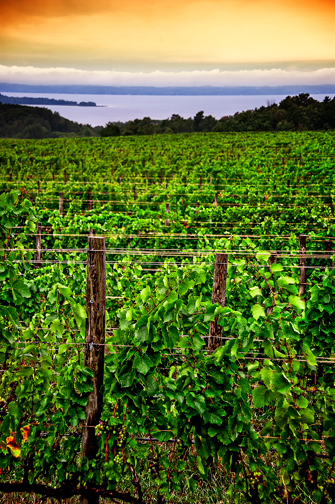Old Mission postcard: land protection taxes benefit farmers – and neighbors
In a land with vistas that put a postcard to shame, residents of Old Mission Peninsula have twice voted to tax themselves so that cherry orchards and vineyards stay that way.
The immediate beneficiary: Farmers that might otherwise sell to real estate developers eager to capitalize on the peninsula's scenic charms. They get a check for their property's development market value in exchange for guaranteeing the land will remain agricultural.
Thus far, some 6,000 acres of Peninsula Township's 18,000 acres have been preserved through this program and other conservation measures. That represents about two-thirds of its agricultural land.
And while it could be termed yet one more version of agricultural subsidy, many residents believe they profit in this equation as well.
“You are preserving what you moved out here for,” said Mark Nadolski, a realtor who migrated to the peninsula from suburban Detroit in 1973. “You move here for a reason, to preserve the beauty, to look at the farmland. It's a no-brainer to save that. As a realtor, I probably lost some money in not promoting development. But at the same time, I can sleep at night.” Shaped by glaciers, the 16-mile-long peninsula juts like a finger into the blue-green waters of Grand Traverse Bay just north of Traverse City. The same geographic traits that define its beauty also explain its value to fruit farmers: The temperate surrounding waters form a protective micro-climate, while its spine-like central ridge drains cold air from crops.
The first cherry orchard was planted in 1852, foretelling what would become the peninsula's primary crop. Concentrated on the peninsula and surrounding region, Michigan farmers grow 75 percent of the nation's tart cherry crop.
But back in 1994, no one was quite sure how voters would respond when they were asked to approve 1.25 mills over 15 years to raise an estimated $2.6 million. Officials estimated it would be enough to preserve 2,000 acres.
“The survey that we commissioned said that we would have a close vote. It was a crap shoot,” recalled Rob Manigold, a lifelong peninsula resident and township supervisor since 1988.
But by a margin of 53 percent to 47 percent, they said yes. It was the first such approval in the Midwest and launched the most successful program of its type in the state.
Prior to the vote, Manigold said, there had been growing concern that encroaching development would mar the quality of this rural community, which had a population of 5,533 in 2010.
That was amplified by the sale of a farm along the peninsula's main highway and its conversion to a housing development, he recalled. Just a few months before the vote, residents could see workers burning brush as they cleared the land.
“It was being bulldozed and put into subdivisions. People would call up and say their kids were crying when we drove by. That kind of hit home,” he said.
According to the Land Trust Alliance, a Washington D.C.-based nonprofit conservation organization, a researcher queried 23 longtime farm families on the peninsula prior to the vote. All but two said they would like to pass their farm on to their children but that costs had gotten so high their children couldn't afford to buy it.
In 2002, voters approved a second millage, adding .75 mills and extending both millages to 2021. This time, nearly 60 percent approved.
Bern Kroupa, a cherry farmer with a couple hundred acres, figures the peninsula would look a lot different today without it.
“We would probably have a lot more of what I call wildcast housing, helter-skelter, unplanning incursions into farmland. They usually don't work well together. It would have been a dispiriting and ugly landscape.”
Realtor Nadolski recalled that he moved from Farmington Hills, a community which has undergone significant change since he lived there.
“What could have happened here happened down there. It was farms, wetlands, open land. Now it is a concrete jungle, buildings and highways.”
Michigan Education Watch
Michigan Education Watch is made possible by generous financial support from:
Subscribe to Michigan Education Watch
See what new members are saying about why they donated to Bridge Michigan:
- “In order for this information to be accurate and unbiased it must be underwritten by its readers, not by special interests.” - Larry S.
- “Not many other media sources report on the topics Bridge does.” - Susan B.
- “Your journalism is outstanding and rare these days.” - Mark S.
If you want to ensure the future of nonpartisan, nonprofit Michigan journalism, please become a member today. You, too, will be asked why you donated and maybe we'll feature your quote next time!


 The purchase of development rights on Old Mission Peninsula in Grand Traverse County has spared thousands of acres of agricultural land. (Photo by Aaron Tackett – Always Aperture Photography)
The purchase of development rights on Old Mission Peninsula in Grand Traverse County has spared thousands of acres of agricultural land. (Photo by Aaron Tackett – Always Aperture Photography)
